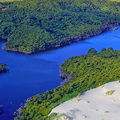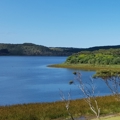About the FIF dune lakes project 2018-2023
The goal of the project was to improve the water quality of a number of Northland’s dune lakes through a range of work streams that specifically targeted the threats to dune lakes.
Over the five-year project, the workstreams were:
- Eradicating water-weeds
- Controlling pest fish
- Removing grass carp
- Stock exclusion through fencing and reticulation
- Remedying nutrient and sediment inputs
- Education about dune lakes for school students and local communities
- Collaborating with tangata whenua and other key partners
Freshwater Improvement Fund
The Ministry for the Environment’s Freshwater Improvement Fund (FIF) committed $100 million over 10 years to improve the management of New Zealand’s lakes, rivers, streams, groundwater and wetlands. As part of the FIF, the Northland Regional Council received matching-funding to improve the water quality of some of Northland’s dune lakes. The total project value was $1,565,950 over five years.
The council has a second FIF project - Waimā Waitai Waiora - aimed at improving water quality in the Northern Wairoa River and its tributaries.
Eradicating water-weeds
The focus of this workstream was the eradication of the invasive water weed Lagarosiphon major from Lake Ngatu and Ceratophyllum demersum (hornwort) from five other lakes.
In the past, a range of options were used to remove weeds, including mechanical removal, biological control (grass carp) and treating the lakes with targeted herbicides. Each of these methods were used in Northland in the past. The herbicide has proved to be the most successful long-term option so far. Endothall targets the invasive aquatic weeds Lagarosiphon major and Ceratophyllum demersum (hornwort) and doesn’t affect native plants or fish. Microbes in the lake bed break it down into its constituent elements: oxygen, carbon, hydrogen, and potassium. In the spring of 2020, council used Endothall (Aquathol K) to successfully control Lagarosiphon major in Lake Ngatu. In the summer of 2022, council used Endothall (Aquathol K) to successfully control hornwort in Lakes Tutaki, Egg and two lakes at Mt Camel.
Controlling pest fish
The workstream focused on the removal of several species of pest fish from eight lakes. The aim of the project was to:
- control pest fish in high priority lakes through manual netting, trapping and electrofishing
- facilitate communities and landowners to continue pest fishing under NRC’s permits.
As part of the Freshwater Improvement Fund (FIF) Dune Lakes project, a mail survey was conducted to obtain information on the distribution of four invasive water weeds and exotic fish. The results from this survey helped the project team to prioritise pest fish control operations.
Removing grass carp
This workstream focused on removing grass carp from four dune lakes: Roto-otuauru (Swan), Midgley, Waingata and Heather. Herbivorous grass carp were introduced to these lakes to eradicate and prevent the spread of highly invasive oxygen weeds such as hornwort and egeria. This will also help prevent their spread to other high-value dune lakes. The fish must now be removed to allow the lakes to return to a vegetated state.
Stock exclusion through fencing and reticulation
This workstream included fencing out stock at several key lakes with some reticulation where required. These lakes included Shag (just north of the Kai Iwi Lakes), Midgley’s (west coast), and Wahakari (Far North).
Remedying nutrient and sediment inputs
This workstream sought to manage the amount of nutrients and sediment entering select dune lakes through remedial work on drains and gullies and redirection of flows, by constructing swales, sediment traps and wetland areas. Swales and sediment traps were constructed at Lake Ngatu and a wetland area planted by the local school on the lake edge. More work is planned near Black Lake, one of the Kai Iwi Lakes.
Education, information and community support
This workstream included a series of 17 ‘get to know your dune lake’ field days for students from local schools and their communities. These field days included hands-on learning sessions looking at lake plants, fish and learning about water quality. Education events were held at ten lakes, including Lake Ngatu (Awanui), Lake Waiporohita (Karikari) Lakes Kanono and Humuhumu (Poutō) and the Kai Iwi Lakes. These events were run in partnership with the Enviroschools and Te Aho Tu Roa programmes, and up to 1,000 students attended over the five years.
A collaborative project
The project worked in partnership with mana whenua, iwi and hapu, to ensure the cultural values and aspirations of mana whenua were considered and included in the planning and delivery of the project.
Community engagement was key to the success of the project and a number of events were held to ensure local residents and landowners were informed and had the opportunity to provide feedback and have any queries or concerns addressed.
We worked with a range of partners to protect and restore some of Northland’s dune lakes:
- Ministry for the Environment
- Ngāti Kurī
- Te Aupōuri
- Ngāi Takoto
- Te Rarawa
- Te Roroa
- Te Uri o Hau
- Patuharakeke
- Ngati Whatua
- Enviroschools
- Te Aho Tu Roa
- Department of Conservation
- Northland Fish & Game Council
- Far North District Council
- Kaipara District Council
- NorthTec
Get in touch
For more information on the project, you can contact the team by email at: info@nrc.govt.nz


